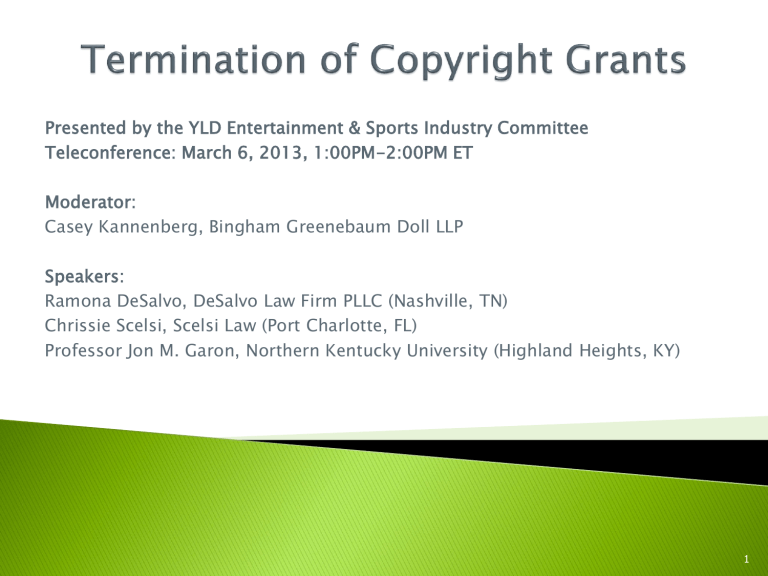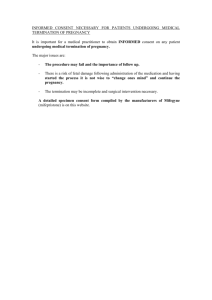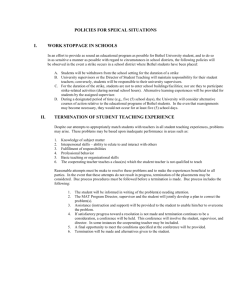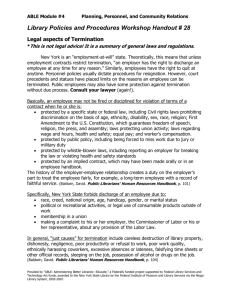terminations public policy

Presented by the YLD Entertainment & Sports Industry Committee
Teleconference: March 6, 2013, 1:00PM-2:00PM ET
Moderator:
Casey Kannenberg, Bingham Greenebaum Doll LLP
Speakers:
Ramona DeSalvo, DeSalvo Law Firm PLLC (Nashville, TN)
Chrissie Scelsi, Scelsi Law (Port Charlotte, FL)
Professor Jon M. Garon, Northern Kentucky University (Highland Heights, KY)
1
Ramona P. DeSalvo
DeSalvo Law Firm PLLC
1720 West End Avenue, Suite 403
Nashville, TN rdesalvo@ramonadesalvo.com
March 6, 2013 2
17 U.S.C. § 203
January 1, 1978 to present
17 U.S.C. § 304
Pre-1978 renewal extensions
3
Second chance to author and family to benefit from author’s mental labors.
4
Termination of the grant may be effected at any time during a period of five years beginning at the end of thirty-five years from the date of execution of the grant; or, if the grant covers the right of publication of the work, the period begins at the end of thirtyfive years from the date of publication of the work under the grant or at the end of forty years from the date of execution of the grant, whichever term ends earlier.
5
6
Intervivos transfers or licenses by author may be terminated by author, a majority of authors, or majority of beneficiaries as a unit
per stirpes majority
If grant covers right of publication, 35 years from date of publication or 40 years from date of grant whichever term ends earlier
Publication: work made available to the public for sale or distribution
7
8
9
Yes, all are transfers subject to termination.
2. What if the Artist copyrighted the five pre-
1978 compositions prior to January 1, 1978?
10
It does not matter if works copyrighted before 1978.
The
intervivos
transfer by the author took place after January 1, 1978.
Date of transfer (grant) matters – must be
January 1, 1978 or after to be governed by
Section 203.
11
12
13
14
15
16
17
18
Prepare and send notice of termination
19
•
Author
•
Joint authors: majority of authors who executed the grant
•
Deceased author: majority of beneficiaries voting as a unit for each author – per stirpes
•
•
•
•
Surviving spouse
Surviving children
Surviving children of deceased child
Author’s executor, administrator, personal rep, trustee
20
1. A & B wrote the hit song “Forever” 50/50
2. A transferred his share of the copyright to C
3. Two years later, B transferred his share to D.
4. Does B have to join A to terminate A’s transfer to C? Does A have to join B to terminate B’s transfer to D?
21
22
The original transferee or its successor-ininterest.
Consider mergers/buy-outs/ bankruptcies/catalog sales/going out of business sales/sole proprietor
23
•
Name of the copyrighted work
•
Name of at least one of the authors
•
Date of original copyright for each work
•
Copyright registration number, if available
•
Identify the agreement (grant) to which the termination applies
•
Name(s) & address(es) of transferees whose grant is being ended
•
The effective date of the termination
•
If the writer is deceased , list the names of the successors to the deceased writer and the relationship
24
Personal service or first class mail to last known address of original transferee or successor-in-interest
Record notice of termination with copyright office BEFORE effective date of termination
Current fee: $105.00 for single title
$30.00 for each additional group of ten titles
25
26
Motion to Strike state law claims and Motion to Dismiss federal declaratory relief claim
•
Does the California Anti-SLAPP statute apply to Plaintiff’s action?
•
Are the termination notices valid?
27
State law claims barred if it arises from any act of a person in furtherance of the person’s right of petition or free speech in connection with a public interest
Bars claims based on communications made in an official proceeding which includes establishing a property right.
Copyright termination involves the establishment of a property right. It is not a ministerial act.
28
B/P shifted to Plaintiff to demonstrate that they had a reasonable probability of success on the merits of their breach of contract and breach of covenant of good faith and fair dealing.
Plaintiff argued it was not preventing exercise of termination rights, but if such rights were exercised, it breached the agreement defendants made with Ray Charles.
29
30
31
32
Do rights fall within “zone of interests” protected by statute or constitutions?
Protecting a third party interest?
Authorized to sue under the Copyright Act?
33
Congress can limit zone of interests.
Look at Copyright Act and application of
“zone” as beneficial owner turns on interests protected by
§§
304 and 203, not resulting damages.
© act addresses authors/statutory heirs and the grantees & their successors
34
Court looked at interplay between
§ 501(b) beneficial owner and §§ 203 and 304.
Termination protects widow(er) and children and requires notice to grantee(s) & successor(s)
Beneficial owner has no “seat at the table.”
Foundation also has no third party standing to bring the claim on behalf of Warner/Chappell.
35





